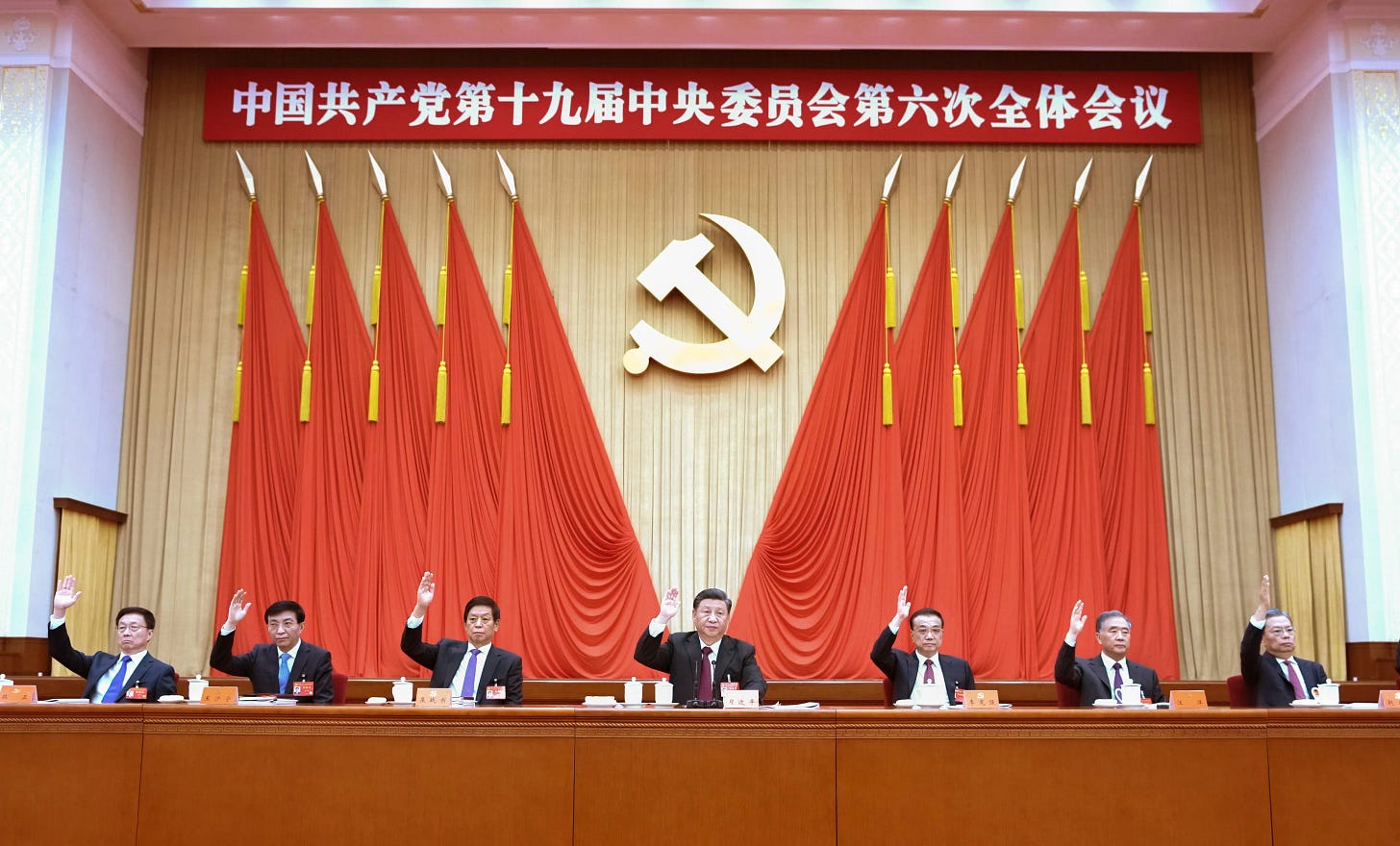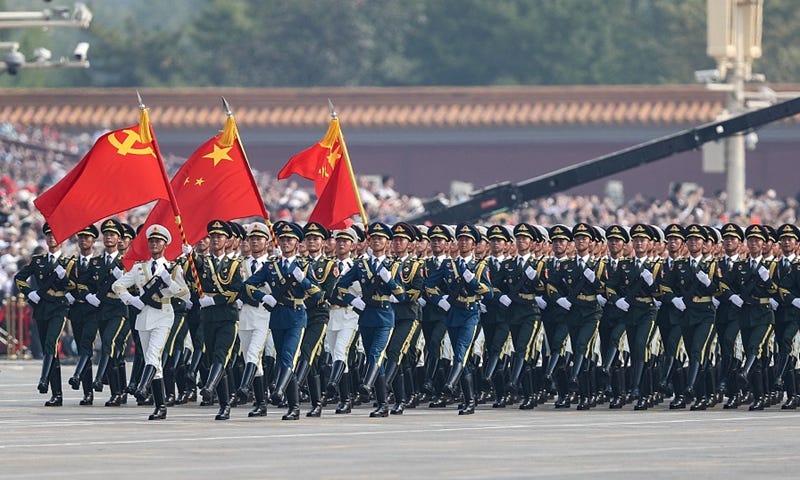Why is the Chinese Communist Party important?
The Paramount Authority
This article is the primer for our upcoming article “What does China want?”
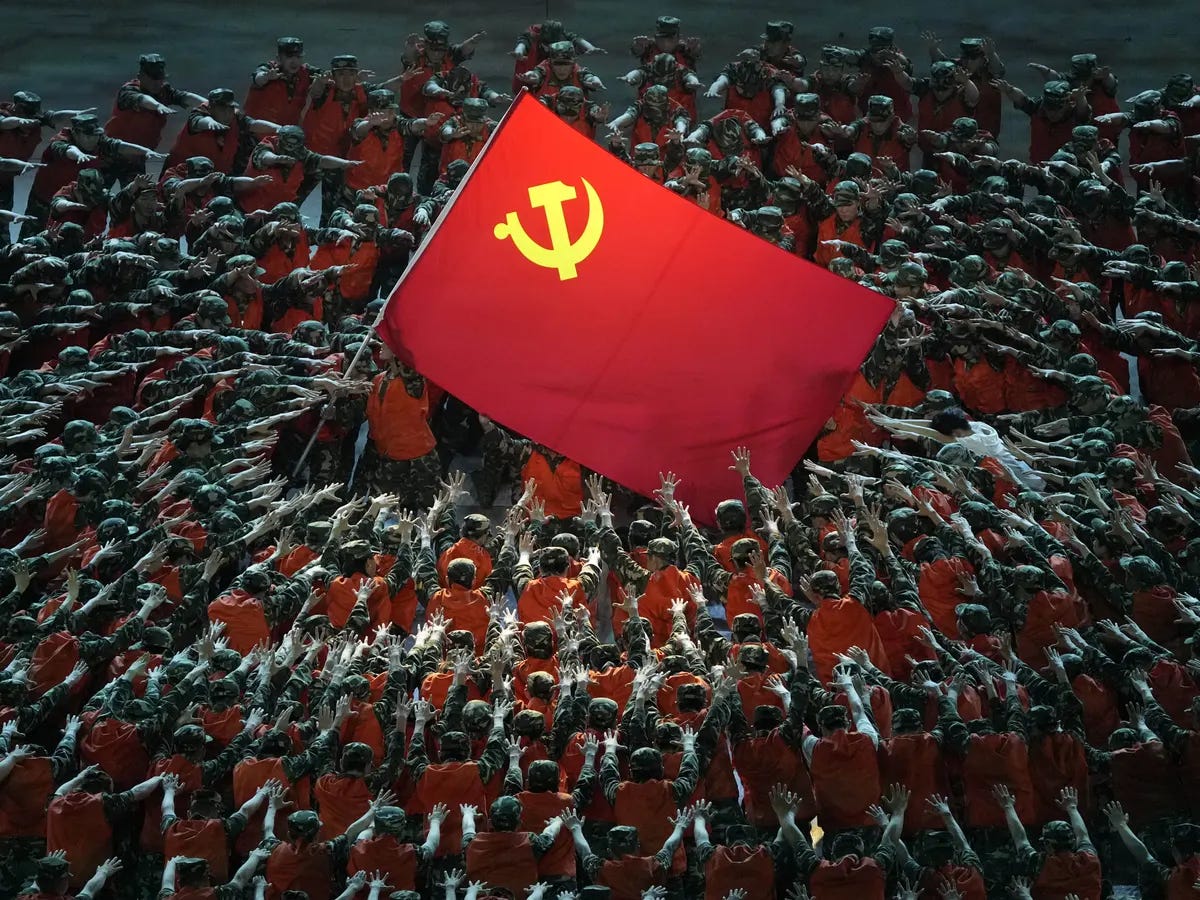
Confusion reigns in the US on the topic of the Chinese Communist Party (CCP). Many Americans, particularly those in the business community, outwardly maintain the belief that the CCP can be separated from mainland Chinese society, business, and even local government. This is quite a fantastic belief. The CCP is certainly not omniscient, but it does desire to control all facets of Greater China (Mainland China, Taiwan, Hong Kong, Macao, Tibet, Xinjiang, Inner Mongolia, the South China Sea, and ethnically Han peoples living overseas). This article will describe the organizational machinery that the CCP uses in its quest for control.
At the very top, the CCP maintains power through a small group of (currently) seven men known as the standing committee of the political bureau (politburo) which meets at a minimum weekly. This committee has varied in size from five to eleven members, and may change in size again in the near future. The first amongst equals of this group is Xi Jinping. This is because Xi currently serves in three simultaneous roles. The first is as general secretary (总书记) of the Chinese communist party central committee (国共产党中央委员会). There are two important things to know about the central committee. First, it is made up of the CCP’s senior leaders and acts as the de facto executive function of the country. Second, it is not a national government organization (like the executive function in the US, the Office of the President) but a Communist Party organization.
Control of the State
Xi acts as head of the PRC central government in his second role as chairman (主席) of the People’s Republic of China (this is the official title although Western media refers to this as the “president” of the PRC). This position acts as the de jure head of the PRC’s “central/federal government.” There are three major levels of government in the PRC, much like the US. The highest level is the central government in Beijing, similar to the US federal government in Washington, DC. The intermediate level consists of provincial and special district governments which are similar to US states (though not with the same rights and duties). Finally, both the PRC and the US have local or municipal level governance systems.
The PRC central government consists of ministries (部门), many of which are superficially similar to the departments of the US government. These departments are staffed by civil servants who work in central government, not party organizations. However, leadership positions within the government departments are generally reserved for party members, whether or not they come from that particular government department or have any experience in that department’s domain. Deputy positions in leadership are usually government billets. Therefore, the government post is always junior to the Party post.
CCP Organization Department (中国共产党中央委员会组织部 / 组织部 for short) appointments in the central government have some similarity to the US plum book, a list of presidential political appointment positions that both Republican and Democratic administrations use to fill government (not party) leadership positions. However, the Organization Department is a Party organ, not a government one. Therefore, the Party controls government leadership.
PRC central government departments, compared to their US counterparts, typically have very little flexibility or authority outside of maintaining previously established CCP policies. The perfect example is the PRC Ministry of Foreign Affairs (外交部), whose diplomats are severely restricted in their independence. PRC diplomats are expected to repeat the CCP’s main line abroad, not necessarily conduct decentralized negotiation or diplomacy. A telling difference is that the US State Department maintains a dissent channel. This channel is specifically used not for administrative, performance review, or other mundane tasks, but for serious and substantive disagreement on matters of foreign policy. The PRC Ministry of Foreign Affairs has no such channel, since it trains diplomats to obey orders from the CCP immediately, without question, and without seeking further information. PRC diplomatic recruits today are still taught a key Zhou Enlai phrase: “diplomatic authority is limited” (外交工作授权有限).
Provincial and special district level executive authority is exercised by a Communist Party Provincial Standing Committee (省委常委). The senior member of this committee is the Communist Party Secretary, while the actual governor ranks second. Communist Party Secretary positions are controlled by the CCP Organization Department (组织部), ensuring Beijing’s tight control of what happens around mainland China.
Local level municipal government is still a function of the CCP. Surprisingly, there are elections in some places at the most grass-roots level for municipal level state government positions. However, all of the candidates must have the approval of the CCP. Within mainland China, there is no escaping the reach of the Party.
It is interesting to note that the US consulting firm McKinsey engaged in client work with provincial and municipal level governments in the PRC and then claimed that this was in no way connected to work with the CCP. This was clearly just attempting to paper over a lapse in judgment on their part by attempting to confuse Americans that don’t know all of these governmental systems are propagated, staffed, and connected by the CCP.
The career of the former Minister of Public Security, Zhao Kezhi (赵克志), serves as a good example. Zhao started as a middle school teacher in 1973. By 1975, Zhao had joined the Party and served as the Party Chief of different counties and then cities throughout the PRC. This was his time at the local or municipal level of government.
Then from 2001, with appointment to Vice Governor of Shandong Province, Zhao leapt to the provincial level of governance, though in a junior government post and not in a senior CCP post. After holding other positions as vice governor and governor (again, government posts junior to the provincial party posts), he eventually worked his way to the senior provincial executive side as the Communist Party Secretary of Guizhou province in 2012.
After a provincial Communist Party Secretary role in Hubei, Zhao was then elevated to be head of the Ministry of Public Security (MPS) in 2017. The MPS is a central government ministry (部门), headed by CCP officials.
Presumably, Zhao had done a good job for the Party as a local, provincial, and then central official. Depending on the specific office, he is sometimes a government official and sometimes he is a party official. Certainly, Zhao had interfaced with the MPS at least at the provincial level, but is not a specialist in the policing or internal security role that he was put in charge of. However, the CCP felt he was loyal, often a more important attribute than skill.
In further recognition of Zhao’s rising status in the Party and his loyalty to Xi Jinping, he was a member of the 18th and 19th central committees (the de facto executive organization, as mentioned at the beginning of this article). Zhao was also elevated to become a State Councilor. The State Council is a handful of senior government officials who act as the de jure executive for the national government of the PRC, but do not act as the executive function of the CCP (the true source of power) or the country.
Control of the Military
Xi Jinping’s third role as chairman (主席) of the central military commission designates him as the CCP’s commander-in-chief. The PRC military has many fundamental differences with the US military. Perhaps the most important is that the People’s Liberation Army (PLA) is not China’s army and not the government’s/state’s army. The PLA is explicitly the CCP’s armed wing, and PLA members take an oath to the Communist Party, not to their own country.
“I am a member of the People’s Liberation Army. I promise that I will follow the leadership of the Communist Party of China, serve the people wholeheartedly, obey orders, strictly observe discipline, fight heroically, fear no sacrifice, loyally discharge my duties, work hard, practice hard to master combat skills, and resolutely fulfill my missions. Under no circumstances will I betray the Motherland or desert the army.”
In Xi’s guidance to the PLA, he also ordered all PLA forces to “inherit the red gene.” The PLA must be engaged in “loving the Party, worrying about the Party, promoting the Party, and protecting the Party.”
In contrast, US officers and enlisted swear to support and defend the US constitution against all enemies. There are no mentions of political parties, and US service members are generally expected to be apolitical by both custom and military regulation.
Since the PLA is explicitly the CCP’s military wing, political officers (also known as commissars) are an important feature of the chain of command not seen in the US. It is the political officer who leads the party committee of military units from the company level above. The party committee system exerts a high degree of political control within the PLA, and ensures that party orders will be followed no matter what internal or external emergency the CCP faces. PLA political commissars and commanding officers are meant to exercise joint leadership of their units. While this flies in the face of US philosophies on military effectiveness, the PLA dual-leadership system likely is required to keep the armed forces loyal to the CCP especially in its most dire times of emergency, such as the Tiananmen Massacre.
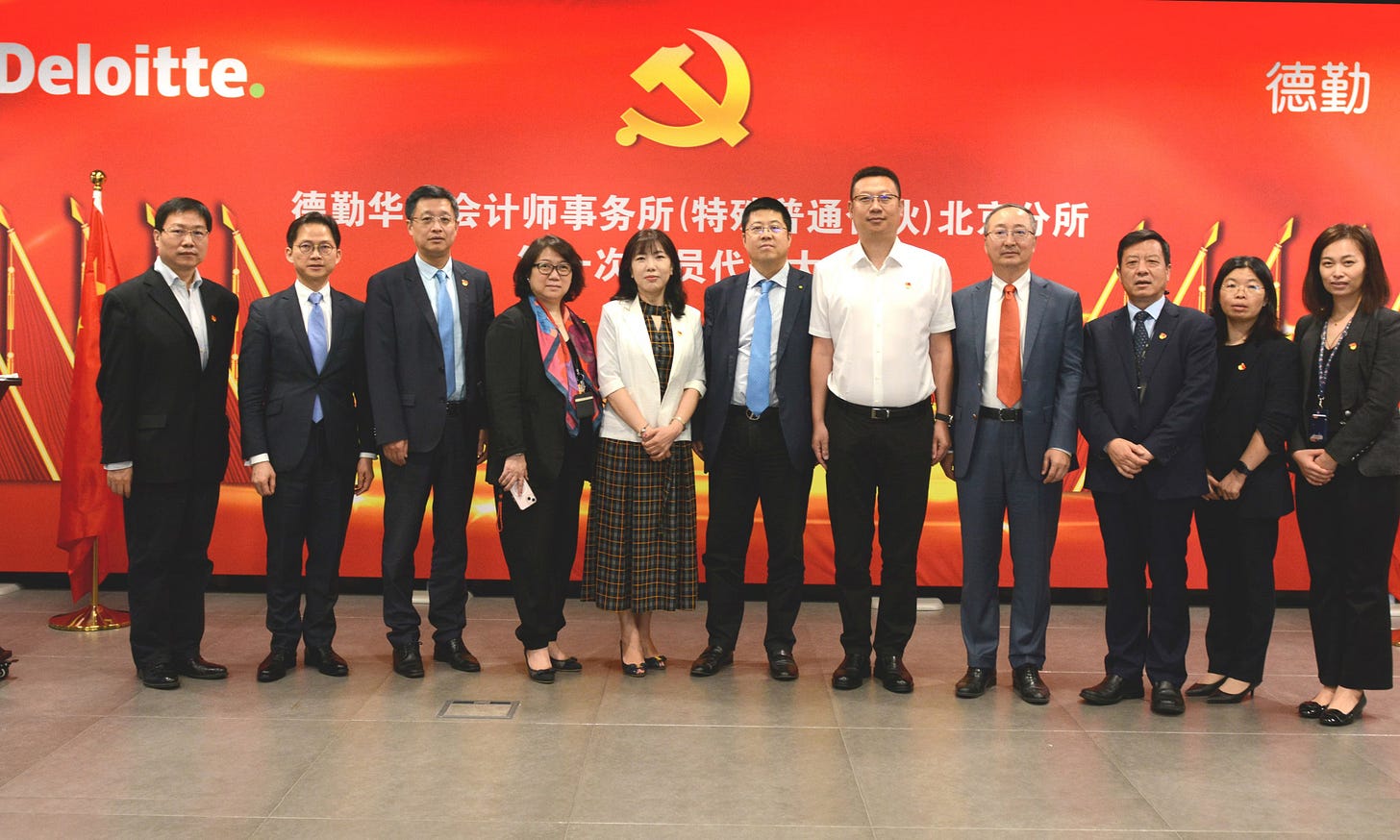
Control of Business
The largest businesses in the PRC are state-owned enterprises (SOEs). SOEs are organizations that conduct commercial activities for the PRC government and are led by CCP officials. The most important economic sectors (telecom, energy, aerospace, utilities, steel, infrastructure, pharmaceuticals, military hardware, etc.) are dominated by these government companies. The largest and most influential SOEs are termed central SOEs. The centrals have their leadership appointed by the Organization Department of the CCP and their operations guided by the state-owned assets supervision and administration committee (SASAC), a state, not party organization. Smaller SOEs at the provincial level and below are entirely controlled by SASAC. It would be more accurate to term these organizations state-owned party-led enterprises (SOPLEs)
Non-SOE private businesses are also forced to accept an internal communist cadre structure which is not always delineated to the public. Xi has accelerated this campaign since 2021, and according to the party’s internal metrics, most mainland private businesses are hosts to party bodies. While many observers presume that CCP power within private enterprise is somewhat limited, this would be a mistake. The CCP likely desires private businesses to be more independent and to take risks in order to earn profits and innovate. The CCP allows this as a feature, not a bug. The party structure’s mission is likely to ensure ultimate political subservience to the CCP and enforce convergence between company operations and the national interest (however the CCP defines that).
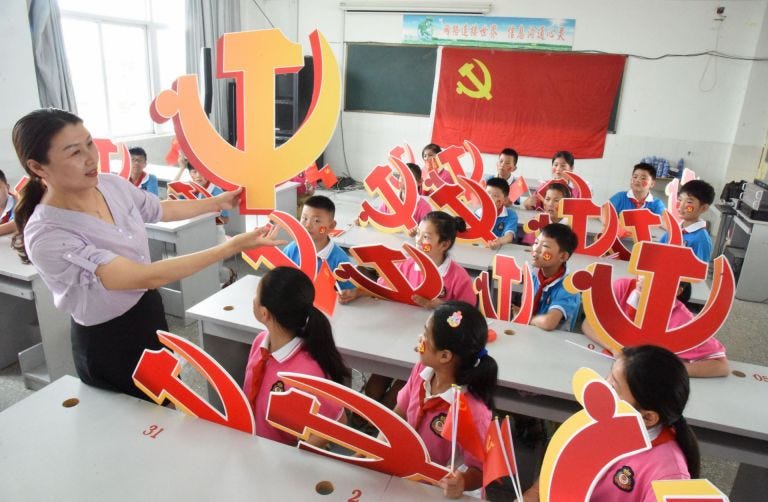
Control of Society
The CCP’s monopoly of power on all the above institutions allows it to project a high degree of social control over PRC society to the individual level. Unfortunately, this power base allows the CCP to project social control internationally, even to the US. The CCP uses a myriad of formal and informal organizations to maintain this control, too many to take a comprehensive view in this post, but a few examples will suffice.
The Ministry of Propaganda maintains massive influence over traditional and social media within mainland China. All major newspapers and information outlets either directly originated from the CCP or are subject to the CCP’s intimate supervision. In many news organizations, reporters and journalists are regularly handed talking points from the Ministry of Propaganda, and those that deviate from the Party line are removed from news work.
The PRC has banned all major US social media apps so that it is easier for the CCP to maintain media narrative dominance and to block US companies from making money in China or having any influence. Control over the information environment in mainland China allows the CCP to pretend to speak for all Chinese people, which it frequently uses as a weapon against the US and others.
This was painfully evident in Beijing’s disagreement with the NBA. A team manager tweeted support for the Hong Kong protest movement and the PRC sought to quickly mitigate the potential fallout. The response from some NBA players was treasonous and appalling, while the NBA took far too long to settle around a noodle-spined commitment to free speech and terminate on-going Xinjiang activities.
Other pillars of American culture including Disney and Hollywood are being co-opted by the Propaganda Department, causing rot from the inside. Without strong US government controls on interaction with the PRC, Beijing will attempt to subvert every American institution it is able to touch.
Consequences for Strategic Competition:
The CCP maintains multiple and overlapping methods of control for all aspects of mainland Chinese society. These methods will never be perfect, but while the CCP rules, it will gain directive control in areas of importance to the Party. The US needs to wake up to the fact that all major interactions with the PRC are interactions with the CCP. Even small-scale interactions have the CCP lurking quietly in the background, ready to strike if a vulnerability surfaces. The CCP seeks to bend all interactions towards the party’s favor in win-win deals where it is the Party that wins twice.
While the US maintains dominance with historically unparalleled excellence in the military, diplomatic, economic, and cultural fields, the PRC has taken a different approach. Xi Jinping relies on political power to weld the disparate tools of national strength together in a strategy that is more than the sum of its parts. PRC SOEs are not as efficient and don’t have the return on investment that large US corporations do. The PRC military is not as competent or technologically advanced as the US military. But the CCP can force these organizations to work together for the party’s benefit, covering each other's weaknesses.
The US generally analyzes these elements of power separately and never considers how they are actually bought together and applied in the real world. The DIME and MIDLIFE acronyms commonly used in these analyses don’t even have a P for political power. Washington has been steeped for too long in the post-Cold War world featuring constitutional republics as the only form of political life left standing. Evil empires in China and Russia will test the US far more than any adversary has since the Revolutionary War.
The US people and government will need to wake up to the fact that dealing with today’s “China” is just dealing with the CCP, a political party that seeks to damage the American people and American interests at every turn. US government policy will need to change to reflect this reality.


